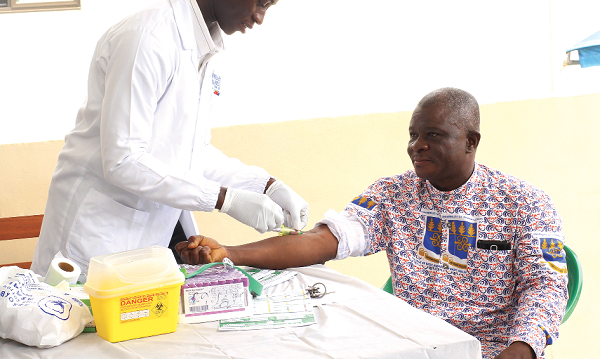
‘Know sickle cell status before choosing partners’
The Sickle Cell Advocates Foundation, a non-governmental organisation (NGO) has advised Ghanaians to know their sickle cell status before choosing their partners.
According to the president of the foundation, Ms Charlotte Owusu, it was necessary for would-be partners to know their sickle cell status in order to make the right decision in choosing their partners and also to avoid giving birth to sickle cell babies.
Ms Owusu said this at a sickle cell screening exercise at the University of Ghana last Monday. It was organised by the Sickle Cell Advocate Foundation and MDS-Lancet Laboratories Ghana Limited and facilitated by the Department of Biochemistry, Cell and Molecular Biology of the University of Ghana.
The event, which formed part of the University of Ghana’s 70th anniversary celebration, was aimed at educating the students on the sickle cell disease.
Concerns of parents
Touching on some concerns of persons with the sickle cell disease, Ms Owusu, who lost her child to the disease, said parents of children with sickle cell faced a lot of problems in their efforts to take care of such childre.
She, therefore, encouraged individuals who are yet to marry to chose their partners to avoid marrying a carrier.
The foundation complained about inadequate centres to provide accessible healthcare for sickle cell patients and, therefore, called for adequate and affordable services for sickle cell patients for the efficient management of the disease.
Ms Owusu also lamented about the cost of managing the disease, which she said was very expensive and therefore called on the government to consider making it free under the National Health Insurance Scheme.
“Know your status”
For his part, the Director of the West African Centre for Cell Biology of Infectious Pathogens of the University of Ghana, Prof. Gordon Akanzuwine Awandare, said “most Ghanaians who are carriers of the sickle cell genes are not aware of their condition. Most people have children with the disease but they do not know that they have the sickle cell genes”, he lamented.
He said it was advisable for Ghanaians to know their status in order to make informed decisions and also help to better manage children with the disease.
He explained that the sickle cell disease was an inherited health condition, pointing out that though there was no treatment for sickle cell, there were treatments that could help relieve pain and help prevent problems associated with the disease.
Some symptoms of the disease included episodes of pain, anaemia, swelling of feet and hands, frequent infections and delayed growth.
